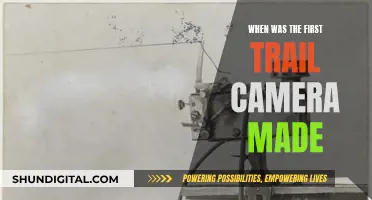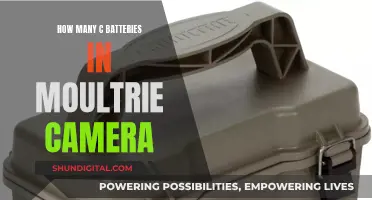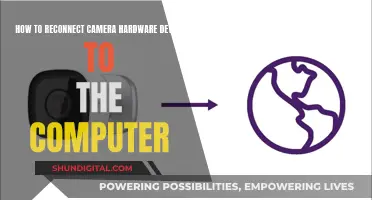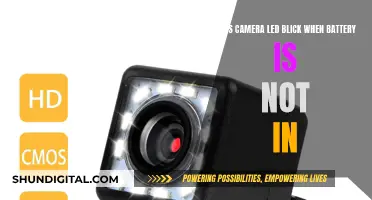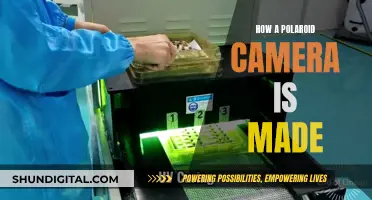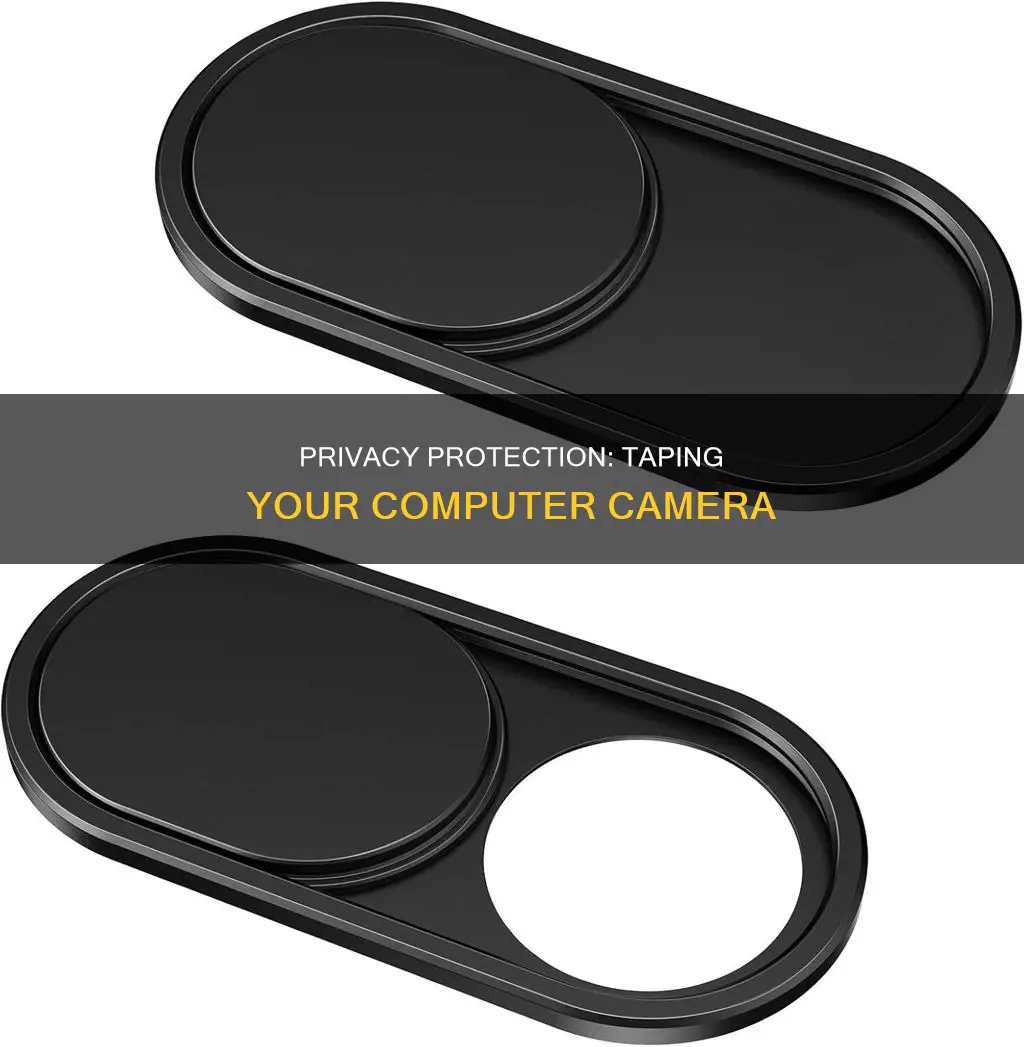
In a world where our lives are increasingly lived online, the question of privacy and data security is ever-pressing. The idea of covering your computer camera with tape may seem like an overreaction or a paranoid response, but it is a practice that even Facebook CEO Mark Zuckerberg and former FBI Director James Comey have been reported to employ. With the rise of remote working and online meetings, our webcams are often left exposed, and it is important to consider the potential risks.
| Characteristics | Values |
|---|---|
| Prevent hacking | Tape prevents hackers from seeing what the camera sees and gaining access to your computer |
| Privacy | Tape prevents people from spying on you |
| Prevent blackmail | Tape prevents hackers from taking photos or videos of you that could be used for blackmail |
| Ease of use | Tape is easy to use and control |
| Cheap | Tape is an affordable way to protect your privacy |
| Accessibility | Tape is easily accessible |
| Effectiveness | Tape is one of the most effective tools to prevent hacking |
| Types of tape | Opaque tape, duct tape, electrical tape, Washi tape, painter's tape, Post-it notes |
What You'll Learn

Webcam hacking is easy
The idea that someone could be watching you through your webcam is a creepy one. Unfortunately, webcam hacking is indeed possible, and it's not even that difficult.
There are several ways a hacker can gain access to your webcam. One of the most common methods is by trickingly installing a Trojan horse virus, which you unintentionally download by clicking on a harmless-looking link in an email or while browsing the internet. This malware covertly takes control of your device, giving the hacker access not only to your camera but also to your private files and browsing history.
Another method is through the exploitation of existing spy software, such as Remote Administration Tools (RATs), which are often installed in corporate environments for remote management of machines. In 2010, two high schools were sued for using the remote monitoring features of an application called LANrev without students' knowledge, capturing 56,000 images of the students.
A third way for hackers to gain access to your webcam is by exploiting its internet connectivity. Internet-connected devices provide a route for hackers to enter your home network. Once inside, they can access not just your webcam but also any other connected devices, such as security cameras or mobile phones.
The consequences of webcam hacking can be serious. Images and videos captured without your knowledge could be used for blackmail, scams, or posted on adult sites. In one high-profile case, a former classmate of 2013 Miss Teen USA Cassidy Wolf hacked into her webcam and threatened to release the photos unless she undressed for him in front of the camera.
So, what can you do to protect yourself from webcam hacking? One simple solution that has gained popularity is to cover your webcam with tape, as famously done by Facebook CEO Mark Zuckerberg. While this may seem like overkill, it is an easy and cheap method to protect your privacy. If you need to use your webcam, you can simply remove the tape and then replace it when you're done. Just be sure to use tape that is opaque enough to block light and won't leave a sticky residue on your camera.
In addition to taping your webcam, there are other precautions you can take. Keep your computer's security software and antivirus programs up to date, and be cautious about clicking on links or attachments in emails, even if they appear to be from a reputable source. If in doubt, contact the company directly through their official website. Finally, consider disabling your webcam in your computer's settings when not in use, especially if you don't plan on using it for a while.
Cameras Behind Classic Movies: 1922's Filming Equipment
You may want to see also

Tape prevents hackers from seeing you
It's not paranoid to want to protect your privacy. Covering your laptop's camera with tape is a simple, cheap, and effective way to prevent hackers from accessing your webcam and seeing you. While it doesn't protect your device from being hacked, it does stop hackers from seeing what your camera sees.
Webcam hacking is a real threat. Hackers can use malware, such as a Trojan horse, to gain control of your webcam and record footage without your knowledge. They can also access your private files, browsing history, and microphone. This information can then be used for malicious purposes, including blackmail, scams, and selling on the dark web.
By covering your webcam with tape, you physically block the camera lens, preventing hackers from capturing any footage or images of you. This is a similar concept to \"air gapping,\" where computers are isolated from the internet to prevent online hacking.
Several high-profile figures, including Facebook CEO Mark Zuckerberg, have been known to cover their laptop cameras with tape to protect their privacy. Zuckerberg's photo sparked a conversation about data security and the simple yet effective solution of using tape.
When choosing a tape to cover your webcam, opt for something opaque that will block the light. It should also be easily removable, as you'll need to uncover the lens for video calls or conferences. Some custom-built stickers are available for webcams, which can be reapplied multiple times and are designed to leave no residue. Alternatively, you can use a Post-it note, washi tape, or electrical tape.
While taping your webcam can provide peace of mind, it's important to combine it with other security measures. Improve your computer's defences by installing antivirus software, enabling security updates, and being cautious about clicking unknown links. Additionally, consider using two-step authentication for your online accounts.
By taking these precautions and covering your webcam with tape, you can effectively prevent hackers from seeing you and enhance your overall digital security.
Surveillance Cameras: Public Access or Private Data?
You may want to see also

Tape won't stop your computer from being hacked
While taping over your computer camera is a good way to protect yourself from unwanted surveillance, it does not stop your computer from being hacked.
Taping over your computer camera is a simple, cheap, and effective method to protect your privacy. It prevents hackers from accessing your camera and taking photos or videos of you, which could be used for malicious purposes such as blackmail or posting on adult sites.
However, hackers can still gain access to your computer and personal information through other means. They can use remote access Trojans (RAT) to retrieve sensitive information such as credit card numbers and passwords. Malware can be unintentionally downloaded by clicking on a harmless-looking link in an email or while browsing the internet. This gives hackers access not only to your camera but also your private files and browsing history.
To protect your computer from being hacked, it is recommended to install reputable security software, including antivirus and anti-spyware programs, and a firewall. Keep your system and software updated, and be cautious when downloading programs or clicking on links. Use strong passwords and enable two-step authentication for added security.
While taping your computer camera won't stop your computer from being hacked, it is still a good measure to protect your visual privacy.
Where Dziga Vertov's Man With a Movie Camera Was Made
You may want to see also

Tape won't leave a sticky residue
In this day and age, we spend a lot of time in front of our computers, so it is no surprise that webcam hacking is a common concern. Covering your webcam with tape is a cheap and easy method to protect your privacy. However, using the wrong type of tape can lead to residue being left behind, which can ruin the overall appearance of your device.
To avoid this issue, you should consider using a tape that is specifically designed to leave no residue. 3M, for example, offers a range of duct tapes that provide a strong hold without the messy cleanup. Their NO RESIDUE duct tape can be used both indoors and outdoors and removes cleanly for up to six months after application. This tape is ideal for temporary and permanent repairs, as it provides a long-lasting bond without leaving any sticky residue.
Another option is to use custom-built stickers for webcams, which can be reapplied multiple times and are designed not to leave any adhesive residue. These stickers are also more aesthetically pleasing than regular tape.
If you are looking for an opaque tape to block out light, Washi Tape is a good option. It is made of natural fibre and comes in different designs, although it is more expensive than regular tape.
In summary, while taping your computer camera has its benefits, it is important to choose the right type of tape to avoid any unwanted residue. By selecting a no-residue tape or custom-built webcam stickers, you can ensure that your device remains residue-free while also protecting your privacy.
Focusing Screens: How Do They Help Photographers?
You may want to see also

Tape is a good form of extra security
It is not uncommon to feel that taping over your laptop camera is an overreaction or a paranoid response to the possibility of hacking. However, the threat of webcam hacking is real, and it is a simple, cheap, and effective method to protect your privacy.
Taping over your camera is a good form of extra security, as it is a physical barrier. This is similar to the concept of "air gapping", where computers are not connected to the internet, preventing hackers from accessing files via an internet connection. Tape is a basic, lo-fi solution, but it is also the most secure.
While it is possible to disable your webcam, and this is often the best option as a backup, taping over your camera is a good visual reminder that your webcam is disabled. It is also a good physical barrier in case malware reactivates your camera.
There are many stories of webcams being hijacked by people looking to spy on unsuspecting individuals, often people they know. In 2009, a student discovered his school-issued laptop was secretly photographing him, and in 2011, a man in California used malware to spy on over 100 women and girls, using the images to blackmail his victims. In the same year, a couple sued a rent-to-own chain after the company used the webcam on a rented computer to spy on them.
Even Facebook CEO Mark Zuckerberg and former FBI Director James Comey have been known to cover their webcams with tape to prevent hacking.
Blackmagic Pocket 4K: Which Batteries to Use?
You may want to see also
Frequently asked questions
Covering your computer camera with tape is a simple and cheap method to protect your privacy. It prevents hackers from spying on you through your webcam, which is a real threat.
You can buy little webcam-blocking clips that can be moved to cover and uncover the camera lens. Some laptops also come with sliding lens caps for this purpose.
The tape should be opaque to block light from entering the lens. It should also be easily removable and shouldn't leave a sticky residue on the camera lens. Some custom-built stickers for webcams can be used, as well as painter's tape, duct tape, or Washi tape.


